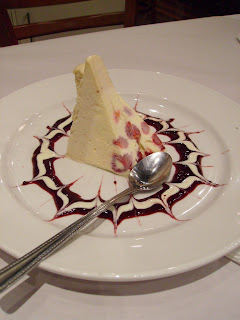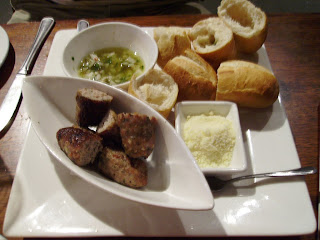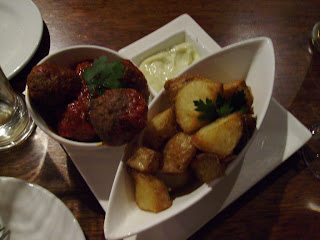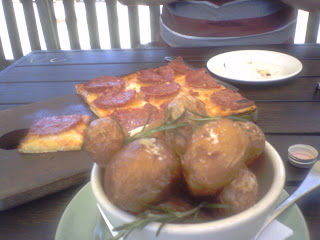Corner of Grattan and Swanston Sts; 03 9347 0474
Mark's is a great option for a cheap feed, close to the CBD. Most of the pizzas are around $8-9 for a medium size (example below). 
The pizzas have quite a thick base, which was a little on the doughy side. It could just be because I'm so used to the thinner style, but with the cheese cooked almost to crispiness, it was a bit of an inbalance. The toppings are generous, but the heavier dough overwhelms them a bit so each doesn't stand out individually. Regardless, the pizzas are freshly and attentively made; are far, far superior to franchise pizza; and they are served by genuinely cheery staff.
29 November, 2007
Mark's Pizza
28 November, 2007
'On Chesil Beach', Ian McEwan
 Much has been written about Ian McEwan's latest, published this year, principally that it is a) very short (in my version 166 pages), b) that it didn't win the Booker Prize and c) whether or not its premise and resolution are plausible.
Much has been written about Ian McEwan's latest, published this year, principally that it is a) very short (in my version 166 pages), b) that it didn't win the Booker Prize and c) whether or not its premise and resolution are plausible.
Briefly, the novella commences with a virginal British couple in their early twenties, Edward and Florence, at a hotel in Dorset on their wedding night. It is 1962, 'a time when a conversation about sexual difficulties was plainly impossible'. The book recounts how they met, touches on their families' backgrounds and returns between each digression to their awkward hotel suite. It is not a plot of action, rather a dual character study, irremovable from the time period. As Edward says, as they finally reach the pure white bed, the only things standing in their way are 'the tail end of religious prohibition, their Englishness and class, and history itself. Nothing much at all'.
The book is short on dialogue, long on description, characterisation and observation. With its length, it is best appreciated in a single sitting - set aside a time and go cover to cover, allowing a cohesive reading that gels the key events, telling background and unforeseen outcome.
Sex is of course a key theme of the novella, but it is played out around the main characters, rather than by them. An extraordinary paragraph on just the third page involves the Dorset flora in a dumbplay of consummation. Florence, as a violinist, is given her passionate outlet through performance. The bias of perspective in the novella falls to Edward, which I found a little isolating, until on second read I noticed more closely the language used to describe Florence's playing.
There is an enormous amount squeezed into these 160-odd pages: two lifetimes and an entire conservative national culture at its cusp before the sexual revolution. The sweep of emotions and concepts is contrasted with the sharpness of the couple's final conversation in Part Five. It's a dramatic change and I think that making the jump with the author is the hardest task for the reader. Previously the novel has relied almost entirely on observation; the majority of that in hindsight. Now we face a conversation where the participants say none of the things they mean, but inform the audience through their interior monologues of what their counterpart cannot know. This exchange is the early 1960s: an educated man and woman unable to express themselves about intimacies, when they can, and are expected to, comment on the Soviet Union or identify birds by their song.
26 November, 2007

"How many store loyalty cards can you possess before you are actually, ironically, guilty of disloyalty?"
Rohan Candappa, "Rules Britannia"
22 November, 2007
Lyrical romantic
21 November, 2007
il Nostro Posto
60 Hardware Lane, Melbourne; 03 9670 9939
Hardware Lane is an unusual part of Melbourne. Diners accustomed to blithely opening unmarked doors, scurrying down hidden staircases and striding fearlessly along laneways to reach fabled restaraunts are, in this part of town, suddenly confronted by maitre d's making themselves, and the restuarant, as conspicuous as possible. There are some pretty extensive menus being proffered, but we elected to go with a restaurant that, with a more succinct menu, could perhaps dedicate themselves to turning out a select ion of very good dishes, rather than pages' worth of OK ones.
ion of very good dishes, rather than pages' worth of OK ones.
Housed in an old warehouse, il Nostro Posto aims for an authentic trattoria feel: framed 'Roman Holiday' prints on the wall; banter in Italian between the staff; and a specials board with Fileto di Manzo and Cotoletta di Vitello. Something in the bright lighting, or the dark wood finish meant the effect didn't quite hit the mark for me.
The wine list is certainly a helper towards the authentic Italian vibe. On our waiter's advice we drank a newly-arrived Sicilian white from the Rallo vineyard. Very dry mouth feel, but with an equally fruity palate.
My main was risotto di carciofi e prosciutto, interestingly presented:
After my recent wranglings with whole artichokes I had great admiration for this well-sized, entirely intact and deliciously steamed/boiled specimen. I was also able to mix the leaves in or savour their nutty flavour alone as it pleased me. The risotto had good consistency and wasn't over-salted. I'd seen a cook carrying tubs of stock through the restaurant, which in my imagination had been ladled out of an ancient, hundred-litre bubbling copper vat in the cellar!
The 'burning finger' lamb cutlets are named from the Italian term indicating that they're eaten hot from the pan with your hands. Again, very visually pleasing. The lamb was thick- cut and well-cooked - juicy pink in the middle. Crisp beans, creamy mash and plenty of soaking gravy...our location may not have epitomised Melbourne but the weather, which had dropped 15 or so degrees in the day and brought plenty of cold rain, certainly did and this dish - part BBQ favourite, part winter-warmer - fitted the conditions perfectly.
Again, very visually pleasing. The lamb was thick- cut and well-cooked - juicy pink in the middle. Crisp beans, creamy mash and plenty of soaking gravy...our location may not have epitomised Melbourne but the weather, which had dropped 15 or so degrees in the day and brought plenty of cold rain, certainly did and this dish - part BBQ favourite, part winter-warmer - fitted the conditions perfectly.
Dessert featured a housemade tiramisu, a dish in which the total should be greater than the sum of its parts. The parts were fine: rich cream, studded with coffee beans, and lots of moist sponge fingers. Unfortunately most of the coffee drenching had dropped to the bottom of the cup, so it was a bit like attacking a drink that you haven't stirred with spoon, and hitting all the gunk at the bottom. Regardless, it was undoubtedly fresh and very enjoyable. Lastly, a picture-perfect fruits of the forest semi-freddo brought together sweet and creamy wedges with a delightfully tart coulis - sensational flavour combinations.
Lastly, a picture-perfect fruits of the forest semi-freddo brought together sweet and creamy wedges with a delightfully tart coulis - sensational flavour combinations.
20 November, 2007
'The Curious Incident of the Dog in the Night-Time', Mark Haddon
 Published in 2003, this book received very positive reviews from many sources, as well as the Whitbread Book of the Year (which disturbingly is now the Costa Book Award, as in the British coffee chain). It is principally an interior monologue of a 15-year-old boy with Aspergers Syndrome, Christopher Boone. The power of the book is in the factual way Christopher relates all of his story: from his genius level understanding of mathematics, his determination to solve the 'curious incident' of the title, and most strikingly the disintegration of his parents' relationship.
Published in 2003, this book received very positive reviews from many sources, as well as the Whitbread Book of the Year (which disturbingly is now the Costa Book Award, as in the British coffee chain). It is principally an interior monologue of a 15-year-old boy with Aspergers Syndrome, Christopher Boone. The power of the book is in the factual way Christopher relates all of his story: from his genius level understanding of mathematics, his determination to solve the 'curious incident' of the title, and most strikingly the disintegration of his parents' relationship.
Positive growth
 "They say the seeds of what we will do are in all of us, but it always seemed to me that in those who make jokes in life the seeds are covered with better soil and with a higher grade of manure."
"They say the seeds of what we will do are in all of us, but it always seemed to me that in those who make jokes in life the seeds are covered with better soil and with a higher grade of manure."
18 November, 2007
Pierogi, Polish Festival
Would you spend an hour in a queue for these tasty morsels?

And they did live up to expectation. The dough was quite thick, but very giving, and slightly salty. This was a good seasoning match to the meat filling, made a little bit peppery by shredded cabbage. On top are some caramelised onions contrasting all the mushy stuff with some crunch. Especially given the Albion Polish Association must have sold several thousand of these on the day, they were a quality, fresh product.
There was also plenty of this fine Polish pilsener, Okocim, to be had!
Sippers
164 Rathdowne St, Carlton; 9348 2808 now closed
Sippers specialises in stocking wines and beers from smaller producers, as well as sourcing the ingredients for their extensive tapas menu from local suppliers. It's a very commendable aim (though for the drinks 'small' doesn't necessarily equate to 'local'). The downstairs bar space features lots of dark wood panelling, red velvet couches, gilt mirrors and barrels with stools. Footpath and upstairs dining are also available.
The Sippers menu is divided into tapas and tascas. The latter actually means 'bar' in Spanish, but as Sippers explain on their website, their tascas are their smaller portions (though prices are fairly similar), so perhaps they mean them as bar snacks. In any case, tapas actually derives from the Spanish for 'lid', and there are few venues outside Spain (indeed, outside Andalucia) that actually serve genuine tapas, rather than just small portions of 'themed' food.
There are some great beers on offer - St Arnou on tap, Hargreaves Hill, Red Hill and a raspberry ale. I tried a Yarra Valley Gewurztraminer, which was a little on the straightforward, fruity side. Excited by the food menu, we picked our top four plates, but decided to stagger the order, to save over-ordering. First up was calamari and octopus in besan flour and tomato jam (not sure why they use the Indian name for chickpea flour, rather than the Spanish, gabanzo).
 The octopus was particularly tasty and had retained good texture and the calamari was giving rather than chewy. I thought the chutneyish tomato jam was the wrong flavour match for seafood.
The octopus was particularly tasty and had retained good texture and the calamari was giving rather than chewy. I thought the chutneyish tomato jam was the wrong flavour match for seafood.
Just as well the food tasted good, since we had waited an hour for it to come out. We were regretting our decision to stagger, and were quite bemused that tapas - ie small, lightly cooked portions - could possibly take that long to prepare.
The second dish we'd ordered was pork sausage with chimichurra (a South American sauce of oil, parsley, garlic and lemon). Points for innovation with this dish:  I love a make-your-own restaurant dish. In this case one puts some chimichurra in the hollowed-out breadroll, sprinkles some parmesan around, then wedges the sausage on top. The pork sausages were dense and meaty and while parmesan may seem an odd addition the whole combination worked very well.
I love a make-your-own restaurant dish. In this case one puts some chimichurra in the hollowed-out breadroll, sprinkles some parmesan around, then wedges the sausage on top. The pork sausages were dense and meaty and while parmesan may seem an odd addition the whole combination worked very well.
During our interminable wait for food we'd decided not to order Round 2 in protest, however we were quite impressed with what was eventually served up. So we ordered again, this time lamb and rosemary meatballs and patatas bravas.

They hadn't been shy with the rosemary and it complemented the softly cooked lamb wonderfully to make a richly flavoured dish. The potatoes were spot on, crispy and salty with a curiously green, gratifyingly garlicky aioli.
There were many other dishes we could have chosen, and they do have banquet options that would satiate a fierce hunger. The wait on the food though was really inexcusable and removed the option for us to pace our way through a tantalising menu, which is how good sharing food should be enjoyed.
15 November, 2007
Risi e bisi
This is a big favourite to cook at the moment - I want to say very springy, but by that I'm referring to the season, not the texture! It's loosely based on the Venetian dish that falls halfway between a risotto and a soup. My version is simply to fry onion and bacon in olive oil, then add arborio rice and a bay leaf and get the rice well covered with the oil. Add stock (or just water) and bubble away until the rice is cooked - you can have it as moist as you like. Then throw in frozen (or fresh) peas and, because I'm addicted to them, some broad beans and cook for a couple more minutes. Season and add parmesan and head to the balcony to enjoy!
It's loosely based on the Venetian dish that falls halfway between a risotto and a soup. My version is simply to fry onion and bacon in olive oil, then add arborio rice and a bay leaf and get the rice well covered with the oil. Add stock (or just water) and bubble away until the rice is cooked - you can have it as moist as you like. Then throw in frozen (or fresh) peas and, because I'm addicted to them, some broad beans and cook for a couple more minutes. Season and add parmesan and head to the balcony to enjoy!
A variation is to cook whichever legume you've chosen (sugar snap pea, broad bean etc) separately and then puree half, with some cooking liquid, and stir that in with the rice. A bit of mint goes nicely as well.
13 November, 2007
Spuntino Bar, T'Gallant Winery
1385 Mornington Flinders Rd, Main Ridge; 03 5989 6565
If you had to pick a day to head down the Peninsula, purely to augment one's wine supply, this was the day to go. Flooded with sunshine, but too early in the season for the un-ac'ed Pulsar to get uncomfortably hot. Definitely the weather for sundresses, suncream, and sun-drenched lunches!
T'Gallant has an excellent cellar door, with a lot of wines on tasting (including four of their white pinots: makes for a great comparison between the French and Italian styles) and two eating establishments on site: La Barracca Trattoria and Spuntino Bar, which does a simple line of finger food and desserts.
Spuntino has three pizzas on offer, served as half or full. 'Half' refers neither to a semicircle of pizza, nor a mini-disc, rather 12 squares served on a wooden board - a tidy snack for two, whereas a full pizza would provide a more than adequate meal. We went for the salsiccia, with salami, sugo and pecorino.
Foregrounded is a bowl of roasted, herbed potatoes, that we ordered assuming half a pizza wouldn't be enough. Phew, that's a whole lot of carb! And oil - the pizza was smothered with it, pooled into the curled-up salamis. Once the oil was sponged off the salami provided the chewiness, while the base and pecorino where a soft, giving counterpoint. Very moist and very moreish. The spuds were flecked with sea salt and had been scored for extra crispiness.
There's a great view too, over pinot vines that run up and down sloping hills. Next to the wooden trestle tables is part of the winemaking facility, which gives a nice visual flowchart from vine, processing, to the finished product ready to be tasted at the cellar door.
12 November, 2007
'Spain by the Horns', Tim Elliott
 This example has been on my 'to read' list for years - although I don't remember the original source, given my predisposition for all things Spanish it wasn't a surprising entry - but I was so disappointed by it. It had the feel of a book written as an afterthought - the author went travelling, recorded their notable experiences, then decided to write a book about it. This one, however, was pre-planned and the author has a writing background as well, so I was surprised at how it came together.
This example has been on my 'to read' list for years - although I don't remember the original source, given my predisposition for all things Spanish it wasn't a surprising entry - but I was so disappointed by it. It had the feel of a book written as an afterthought - the author went travelling, recorded their notable experiences, then decided to write a book about it. This one, however, was pre-planned and the author has a writing background as well, so I was surprised at how it came together.
09 November, 2007
Golden Pizza
500 Lygon St, Brunswick East; 03 9383 1386
Despite its proximity, it's taken me almost two years to get around to sampling Golden Pizza. It's further away than il Carusi and, while closer, doesn't have the trattoria ambience of La Bussola.
 Lots of big torn basil leaves, heavy with luminous white ricotta and dotted around with halved cherry tomatoes. Good, fresh flavours, though perhaps slightly cloying on the ricotta - combined with the thicker base - and mainly because I've eaten so many wafer thin, crispy bases of late - it was a little chewy. The dough was excellent though: firm, but came apart well and ever so slightly sweet.
Lots of big torn basil leaves, heavy with luminous white ricotta and dotted around with halved cherry tomatoes. Good, fresh flavours, though perhaps slightly cloying on the ricotta - combined with the thicker base - and mainly because I've eaten so many wafer thin, crispy bases of late - it was a little chewy. The dough was excellent though: firm, but came apart well and ever so slightly sweet.Update: Golden Pizza have moved across the road to 465 Lygon St, Brunswick East. Their phone number is the same.
07 November, 2007
Cup of Content
It's Melbourne Cup Day (to me the most random of Australian public holidays), the weather is divine, and we need to fill up well at brekkie in preparation for 11am Bellinis and a long wait til the free pub BBQ at 2pm. Et voila, pancakes!
I've achieved some fluffiness through the addition of soda water to the batter, and also by letting it stand while I jogged (hah!) to the service station for a paper. Atop the stack, and melting enticingly in the sun, is homemade banana honeycomb ice cream. There's berries, there's maple syrup, there's lemon...and there's a whole lot of happiness!
'Independence Day', Richard Ford
Published in 1995, Independence Day is the second in a trilogy of novels about Frank Bascombe (The Sportswriter was published in 1985 and the last book, The Lay of the Land in 2005). Each can be read independently. In Independence Day, for example, Frank mentions the death of his son several times, without going into detail - this event was dealt with in the first novel.
Frank is a contemplative man. The novel runs across his experiences on the titular long weekend in the late 80s, so at 450 pages it's slow-paced, musing and reflective, spending as much time in the past filling in details as elucidating current events. Frank, now a real estate agent, spends much of the first day dealing with the Markhams, impossible customers looking for a house, a location and a price-range that doesn't exist. Here is the modern dream turned sour, the Markhams' insistence on being able to get what they want infusing a vile taste into their marriage and leading them into blame and retribution, rather than establishing a happy family home.
Over the weekend Frank interacts with three other key characters - his ex-wife, their 15-year-old son, and his current lover, Sally. Ford discusses notions of love quite tenderly through Frank's interactions with each of these characters. Frank is simultaneously aware that he still loves his ex-wife, but that it is too problematic for them to be together. Throughout the book he ponders the strength of his commitment to Sally, questioning how much true affection he can give to someone else, as distinct from merely being buoyed by his own feelings. He is desparate to spend time with his son, Paul, but is brutal in assaying how much he can love a difficult, irascible teenager.
These events are backdropped by the upcoming Presedential elections - G Bush the First is in the running against Dukakis. Knowing what's going to happen in that backstory, knowing that the world is still being bullied twenty years on, and that houses haven't become any more affordable, gives the reader a stinging insight into the veracity of Ford's words.
And they are beautifully crafted words. Ford often has a very interesting turn of phrase: he uses language correctly, but for his (or his characters') own purpose. He mixes adjectives and nouns quite a lot, for example saying 'defiance cries' rather than 'defiant'. A beautiful example is 'to swoon off into profound unconscious while the cicadas sang their songs in the silent trees'. To have used the noun, 'unconsciousness', would have unbalanced the harmony of the sentence. His commentary on 'independence', and its arbitrariness, is insightful and cutting: the monster trucks taking part in the big day's parade will be later 'crush some Japanese cars out at the Revolutionary War Battlefield'
I was lulled by this booked. Frank spends an enormous part of it driving his car and I had the feeling of being a passenger, of progressing towards a destination without having to be in control of the vehicle, and taking lots of detours, down tree-lined lanes and highways alongside panoramas, on the way there. It's a novel that trusts its reader to bring their own notion of irony, cynicism, politics and how the world works to the book, engage in dialogue with the characters, and learn something if you will.

